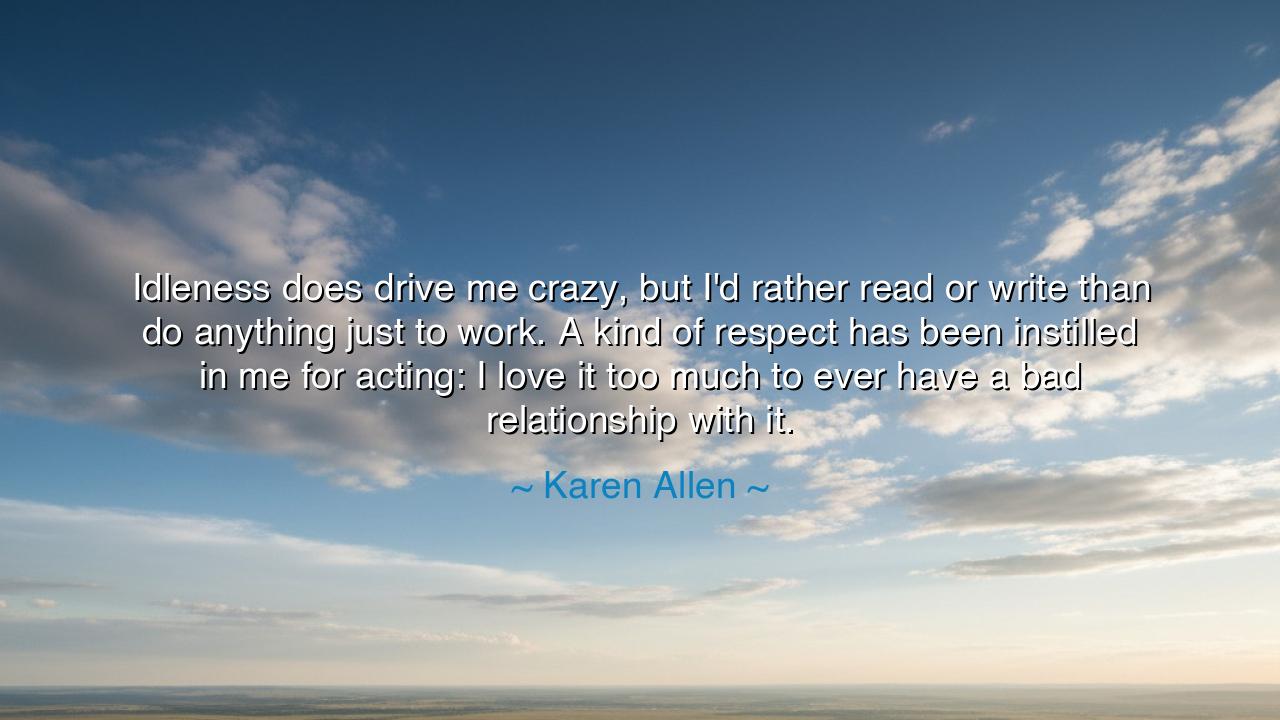
Idleness does drive me crazy, but I'd rather read or write than
Idleness does drive me crazy, but I'd rather read or write than do anything just to work. A kind of respect has been instilled in me for acting: I love it too much to ever have a bad relationship with it.






Hear, O children of art and labor, the words of Karen Allen, who declared: “Idleness does drive me crazy, but I’d rather read or write than do anything just to work. A kind of respect has been instilled in me for acting: I love it too much to ever have a bad relationship with it.” In these words is the voice of one who understands both the danger of wasting time and the greater danger of labor without meaning. She reveals a sacred truth: that work is not to be done for its own sake, but must be joined to love and respect, lest it become drudgery and destroy the spirit.
The meaning of her words shines clearly. Idleness, she says, is intolerable, for the soul is made for growth and the mind for movement. Yet she will not exchange one prison for another, for meaningless work is no better than wasting time. Instead, she chooses the noble pursuits of reading and writing, activities that feed the inner world rather than empty it. And when she speaks of acting, her chosen craft, she names it sacred, too precious to be tainted by resentment or misuse. Her vow is clear: she will not allow her relationship with her art to be corrupted by treating it as mere labor.
The origin of such a statement lies in Allen’s life as an actress who has walked both the shining path of fame and the quieter paths of reflection. Known for her roles in great films, she has also lived a life of contemplation, of teaching, of creativity beyond the screen. From this balance she has learned the wisdom that work is not holy unless it is chosen with love. Her words are testimony of one who has seen others lose respect for their craft, treating it as mere commerce, and has sworn to avoid such a fate.
History, too, offers examples of this truth. Recall Vincent van Gogh, who labored endlessly at his art not for profit, but for love of painting itself. Though poverty pressed him, he would rather endure hunger than betray his devotion by turning his art into hollow work. Or think of Marcus Aurelius, emperor and philosopher, who despite ruling the world, turned always to writing, for in it he found renewal of the soul. Both remind us that true work is sustained not by obligation but by respect and love.
The lesson is luminous: never treat your calling as a burden. The moment you do, your relationship with it begins to rot. Instead, nurture it as one would nurture a friendship or a sacred vow. Work only in ways that deepen your bond with your craft. If you are idle, fill your time with pursuits that feed your spirit rather than drain it. To labor without meaning is a form of idleness itself, for it neither enriches the soul nor honors the gift you hold.
Practical wisdom flows from this. Ask yourself: Do I respect my work? Do I love it enough to protect it from bitterness? If the answer is no, step back, lest you destroy the gift within you. Choose reading, writing, learning, and growth over meaningless toil. If you are blessed with a craft that you love, as Karen Allen loves acting, protect that bond. Do not let it become mechanical, soulless, or purely transactional. Return to it with reverence, remembering always why you began.
So let Karen Allen’s words echo in your heart: respect your art, honor your work, and fill your time with pursuits that uplift the soul. For to give yourself to labor without love is to betray your spirit, but to labor with reverence is to walk in harmony with your gift.
Thus, O children of tomorrow, take this teaching: do not flee idleness only to embrace hollow toil. Choose instead the path of respect, the sacred bond with your craft, and your work will never be your prison—it will always be your freedom.






AAdministratorAdministrator
Welcome, honored guests. Please leave a comment, we will respond soon